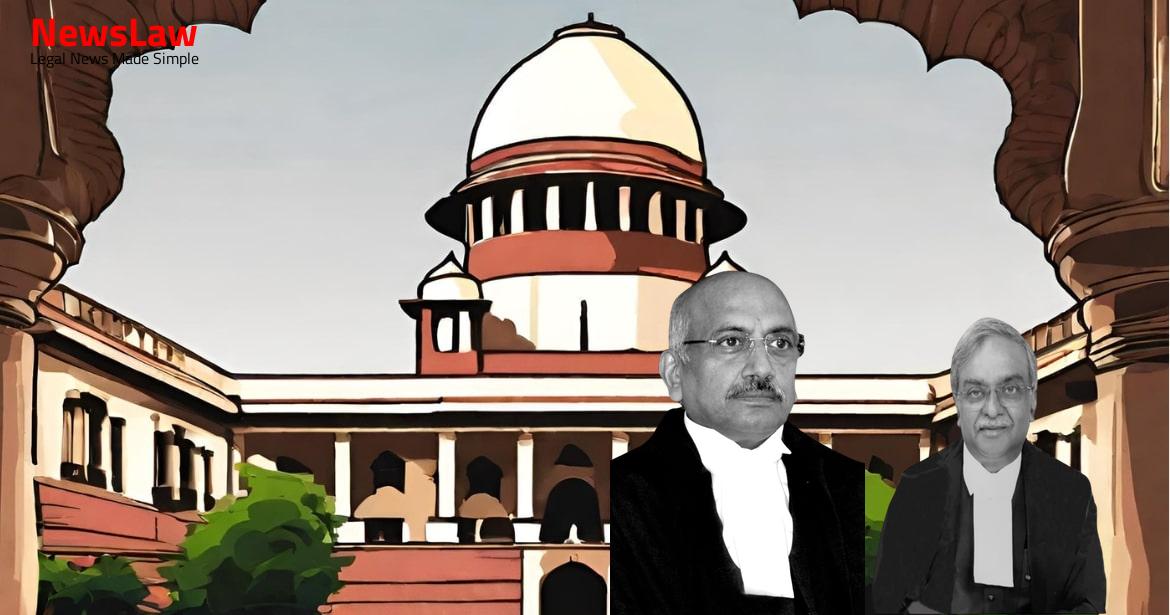In a recent court case, the conviction of the appellant under Section 306 IPC for abetment to suicide was overturned. The court’s in-depth legal analysis highlighted the challenges in proving instigation and aiding in cases of suicide. The importance of evidence, inconsistencies in witness testimonies, and the necessity of demonstrating positive actions by the accused were key points of contention. Explore the nuances of the court’s decision in this complex legal matter.
Facts
- The appellant was residing in the house of the deceased prior to the incident.
- On 05.07.2000, he received a message that his sister had consumed poison.
- The father of the deceased lodged the first information accusing the appellant of his daughter’s suicide.
- Allegations of harassment and proposal for marriage leading to suicide were mentioned.
- Investigation revealed multiple injection marks on the deceased’s body.
- The father was present at the hospital till the deceased’s body was taken.
- The deceased succumbed to poison consumption on 06.07.2000.
- External examination showed injection marks on the elbows.
- Volatile details about the deceased’s condition and communications with family members were highlighted.
- The appellant was convicted for the offence under Section 306 IPC and sentenced to undergo RI for three years and to pay a fine of Rs. 2,000/-
- The Fast Track Court – III Mysore passed the judgment on 06.07.2004 convicting the appellant and imposing the sentence, with a default stipulation
- The appeal filed by the appellant before the High Court of Karnataka as Criminal Appeal No. 1139/2004 (SJ-A) was dismissed on 17.09.2010
- The High Court upheld the conviction and sentence imposed by the trial court, stating that there was no ground to interfere with the order of conviction
Also Read: Challenges in Proof of Firearm Offence: Legal Analysis
Arguments
- Learned counsel for the appellant argues that the prosecution case does not establish abetment to suicide by the deceased against the appellant.
- Conviction under Section 306 IPC lacks support from the evidence on record.
- Witnesses PW-1, PW-2, and PW-4, who are relatives of the deceased, display inconsistencies and contradictions in their testimonies.
- The partial healing of an injury on the deceased suggests it occurred before the incident.
- The threat allegedly made by the appellant regarding marriage lacks credibility.
- Injury marks on the deceased’s body raise doubts about the prosecution’s case.
- Delay in lodging the FIR and lack of disclosure of harassment cast doubt on the veracity of the case.
- The deceased’s familial relationships and contradictory statements by witnesses further weaken the prosecution’s case.
- No evidence of instigation or aiding by the appellant towards the deceased’s suicide is presented.
- Material contradictions in prosecution witnesses’ testimonies reflect on the deceased’s suicidal tendency.
- The prosecution’s evidence points to the guilt of the appellant.
- The prosecution successfully proved that the appellant abetted the deceased to commit suicide.
- The trial court’s conviction of the appellant under Section 306 IPC was justified.
- The respondent argues that there is no merit in the appeal and it should be dismissed.
- The High Court affirmed the conviction imposed by the trial court.
Also Read: Entitlement to Interest on Delayed Refund of Duty Drawback
Analysis
- The delay in lodging the first information, coupled with surrounding circumstances, can dent the prosecution version.
- Contradictions and omissions in the testimony of witnesses can lead to adverse inferences.
- The importance of recovery of traces of poison in cases of death by poisoning based on circumstantial evidence.
- The need for careful assessment of evidence in cases of abetment to suicide under Section 306 IPC.
- Inconsistencies in witness testimonies raise doubts about the prosecution’s case.
- Significance of chemical analysis reports in cases of poisoning to establish cause of death.
- Issues with the timing and delays in certain actions by the witnesses and investigators.
- Critical importance of evidence related to the acquisition and administration of poison in suicide or homicide cases.
- Holes in the prosecution’s case due to lack of evidence regarding the source and method of poisoning.
- Challenges in proving abetment to suicide without clear mens rea and direct acts leading to suicide.
- Section 107 of IPC defines abetment of a thing, including instigation, conspiracy, and intentional aiding
- Section 306 of IPC deals with abetment of suicide, prescribing imprisonment of up to ten years and fine
- Attempt to commit suicide is an offence under Section 309 IPC
- Abetting suicide involves facilitating the commission of suicide either prior to or at the time of the act
- Explanation 1 of Section 107 clarifies that wilful misrepresentation or concealment of material facts is considered instigation
- Explanation 2 further clarifies that any actions to facilitate an act can be considered aiding the commission of that act
- Conviction under Section 306 IPC requires proof of positive action on the part of the accused proximate to the time of occurrence that led or compelled the deceased to commit suicide.
- To establish abetment under Section 306 IPC, there must be a case of suicide where the accused played an active role through instigation or aiding in the act.
- Instigation in abetment of suicide involves provoking, inciting, urging, or encouraging the deceased to commit suicide by goading or urging them forward.
- The presence of mens rea, or the intention to provoke, urge, or encourage suicide, is a necessary element in proving instigation.
- Abetment involves a mental process of instigating or intentionally aiding a person in doing a thing, ultimately leading to suicide.
- Proof of direct or indirect acts of incitement to suicide must be present in cases of alleged abetment.
- Instigation does not necessarily require specific words or actions to suggest consequences, but a reasonable certainty to incite the consequence must be discernible.
- A person committing suicide must do so by themselves regardless of the means employed, and a fit of anger or emotional outburst without intent for the consequences to follow does not constitute instigation.
- The conviction of the appellant is considered wholly unsustainable.
- The evidence on record and the omissions of the prosecution do not leave any room for doubt.
- It is not proven with certainty that suicide occurred.
- Abetment, the essential ingredient of the offense under Section 306 IPC, is also not proven.
- The prosecution failed to prove the charge of abetment to commit suicide against the appellant.
- The conviction of the appellant under Section 306 IPC is set aside.
Decision
- The judgment and order of the trial court dated 06.07.2004 as affirmed by the High Court vide the judgment and order dated 17.09.2010 are hereby set aside and quashed.
- Since the appellant is already on bail, the bail bonds shall stand discharged.
- The appeal is accordingly allowed.
Case Title: KUMAR @ SHIVAKUMAR Vs. STATE OF KARNATAKA (2024 INSC 156)
Case Number: Crl.A. No.-001427-001427 / 2011



